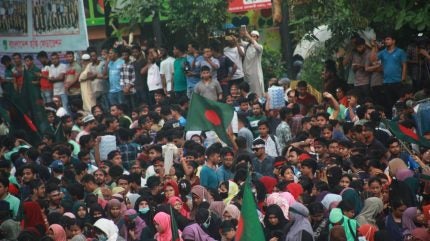
Amid ongoing unrest in Bangladesh, following Prime Minister Sheik Hasina’s resignation and protests over wage increases, the BHRRC reached out to the top 15 international buyers from Bangladesh, along with five key companies identified by local trade unions.
Through a five-question survey, they sought details on how companies are managing these disruptions, maintaining responsible purchasing practices, and supporting suppliers and affected garment workers.
Out of the 20 brands contacted by BHRRC, 11 responded to the questions outlined in the survey, while seven brands including Bestseller, Mango, JC Penney, Kontoor Brands, Levi Strauss, Target, and Tom Tailor, reportedly did not respond.
The Danish apparel brand Bestseller clarified to Just Style that it did not respond to BHRRC when contacted, but instead “declined to participate” in their survey.
Bestseller pointed out that it clearly outlines the heightened risks currently faced in Bangladesh, including its enhanced approach to human rights due diligence in the Enhanced Human Rights Due Diligence Report: Bangladesh.
The brand said: “Mitigation actions detailed in the report include: increasing the frequency of dialogue with suppliers and the frequency of factory visits, monitoring that wages are paid on time at all factories, and that suppliers coordinate the safe transportation for workers to and from factories. Bestseller is providing suppliers adjusted payment terms and is not penalising suppliers in the case of order delays during this period.”
A spokesperson from the US clothing brand Levi Strauss & Co. (Levi) confirmed that the company received the request from BHRRC.
Levi shared a statement on the matter on 13 August: “At Levi Strauss & Co., we believe that workers who make our products should work in a safe and healthy environment and be treated with dignity and respect. Bangladesh remains an important sourcing country for LS&Co., and we are monitoring the current political situation carefully. We have not experienced significant sourcing or shipping disruptions up to this point and all supplier requirements outlined in our Supplier Code of Conduct remain in place, including requirements related to wages and worker health and safety.”
Mango, JC Penney, Kontoor Brands, Target, and Tom Tailor did not respond to Just Style’s request for comment at the time of going to press.
Key findings from BHRRC survey
According to BHRRC, several brands are reluctant to provide information on the impact of the protests.
Based on the survey responses shared by select fashion brands, BHRRC outlined the following findings:
- Forgiveness of delivery delays, imposition of penalties, and seeking price concessions: Among the responding brands, all 13 companies reportedly indicated that they have forgiven delays and not imposed penalties for late deliveries following the supply chain disruptions.
- Worker wages: BHRRC said it inquired how brands monitored worker wage payments and ensured that wages were paid on time and in full for the July-August period.
- Order stability: 12 responding brands (Adidas, ASDA, C&A, H&M, Inditex, Marks & Spencer, Next, PUMA, PVH Corp., Tesco, Primark and Walmart) reportedly affirmed they have not transferred orders to other countries, maintaining order stability in Bangladesh despite the crisis. However, BHRRC said its monitoring has identified reports of orders “moving from the country” since the start of the protests in July.
- Financial support to suppliers: BHRRC claimed that the Bangladesh Garment Manufacturers and Exporters Association (BGMEA) has requested a soft loan of Tk1,900 crore ($159m) from the interim government to help its members cover the payment of workers’ wages for August. BHRRC said it therefore asked brands if they have provided any forms of financial assistance or improved payment terms to help suppliers ensure workers’ wages for July-August were paid in full.
- Long-term commitment to worker welfare: Among the 13 brands who responded, BHRRC noted a general trend towards acknowledging the importance of worker wellbeing, with some brands highlighting steps taken to involve workers directly in identifying and addressing their concerns.
The impact of political unrest on apparel sector
BHRRC said it has been monitoring disruptions to the country’s apparel industry, including reports of factory closures and work stoppages that cost the sector an estimated $150m to $500m per day over the four days from 20-23 July 2024.
It argued that the indirect losses are even greater, claiming that industry insiders estimated nearly Tk6,500 crore ($543m) due to delayed shipments, stockpiling and raised shipping costs and fears of the longer-term impact on the country’s apparel industry.
According to BHRRC, the reported impact of this on workers includes mandatory overtime to meet lead times, increased production targets to offset financial losses or avoid order cancellations, increased transportation costs for workers to reach factories, and non-payment of wages or delayed wage payments.
BHRRC believes corporate accountability and transparency at times of heightened risks to worker rights is critical and is urging the fashion sector to provide a public account of how they are engaging with suppliers in Bangladesh and centring the needs of workers.



